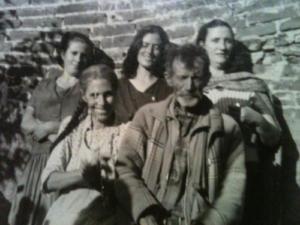We used to hang out at the secluded places. It was easy to find them. There were more cracks to hide in than there were streets. There was a space next to the tennis courts at North Inglewood where we could watch others bomb the concrete after it had been painted over. People only played tennis on the weekends. Sometimes, in middle school, I’d go there with a girl to scam. It was nice, you know, our lives. Suburban safety with just the right amount of stupid risk.
We greeted each other with “What up, nigga.” Daps were given if you were cool with a homie. If it was boring and there was no one around, someone would pull out a shank, or a chain, or, rarely, a gun. I remember they always looked brand new or polished, unlike what you saw in the movies. They’d pass it around like a joint, giving everyone a chance to handle them. I knew we weren’t supposed to, but all the shit we weren’t supposed to do was left at the house.
Some dudes went all out. “My pop don’t know shit. Ridin’ mah ass, nigga! Like some fuckin’ faggot.”
What people who aren’t from Los Angeles can’t understand until they go there and move around is that Los Angeles is a plural. It’s a massive collective of cities and types of people for as far as the smog allows you to see. Things seem more diverse these days than they were in the 90s, but back before I had my first job (and thus exposure to varied individuals), I’d had very little exposure to the nature of that place. The attitudes, the acceptance and the segregation. We lived in a bubble. Granted, an American suburban bubble, but still a bubble. The only white person in the neighborhood was our next door neighbor, Mary, who was kind and crass and not a white person at all, just Mary. She was a notable exception. What it came down to was the white people over in West LA or Marina del Rey or Torrance, and for us there were riots driven by leftover racial tension between blacks and hispanics from the early 90s. Bullshit, of course, because all most of us wanted was excitement and to get out of class.
None of the distinctions mattered, in hindsight. We were a part of the plural. Beaners and wetbacks and niggas and scaredass white people. The words bother me now, more than they did then. I keep them with me, though, because forgetting’s an unwise thing to do.
Senior year, we all volunteered for Earth Club. College loomed and most of our group was looking for ways to score easy points for our applications. We were driven out to Venice to pick up garbage. After the trash detail, and the free time on the boardwalk, we walked back to the beach and perched near one of the piers. One guy and girl—I forget who—started having sex. I noticed them and looked around because, fuck, who the hell starts having sex in the middle of Venice Beach in the afternoon? I was mostly worried for them, as I didn’t want them to get caught. One guy watched them fuck and I leaned against one of the pier struts to watch the waves. It reminded me of my break-up just a few months before then. It may have marked my first case of longing.
My pop and I used to drive along La Brea to get to West LA. He had a gardening route and paid me a whole thirty fucking dollars a week, until I got my own job. I didn’t have much of a choice in the matter. I dragged ass in protest. There was one time when my eighty-some year old grandfather—his father—came with us to lend a hand, and I fell asleep on the drive there. I woke up when they were halfway done to see my grandfather raking the leaves I should have been raking. I pretended to sleep because, hell, I don’t know. I was tired. I was tired of doing things I didn’t want to do and feeling like nothing would ever change. I was angry that life seemed like one chain after another, whether it was class, race, sex, money, violence, drugs, or any of the things that I never bothered to think about until I had a mind willing to deal with it.
